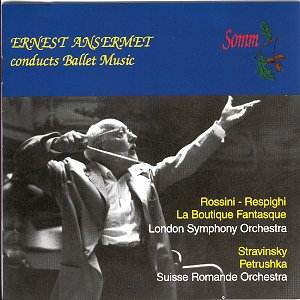These were amongst the most famous of all early LPs.
The Stravinsky came out first and astounded much of the musical world
with the clarity and detail of the sound. The performances were equally
marvellous and, as we can hear today, Ansermet’s direction was an accumulation
of skill and experience such as to mark him as one of the most assured
of all Stravinsky conductors. He had first conducted Petrushka for Diaghilev
and in 1949 he led his own Suisse Romande Orchestra – which he had founded
in 1918 and was to conduct for the next forty-nine years - into the
Geneva Studios for a two day session that was to have lasting repercussions.
It was John Culshaw who noted Ansermet’s ability to
balance an orchestra without recourse to recording engineers and gave
him great credit for these discs’ success saying that it wasn’t simply
Decca’s new techniques but also "Ansermet’s quality of sound
that gave them such individuality." And that is abundantly
true. The balance and clarity is certainly audible but so is the sheer
warmth of sound – listen to the rhythmic sophistication and generosity
of The Shrovetide Fair or, better still, the piano and trumpet
exchanges in Petrushka’s Room. There is tremendous presence and
atmosphere here, an absence of distracting surface noise and an internal
clarity to Ansermet’s conducting that all cohere to produce a reading
of such startling conviction.
Ansermet’s knowledge of the Rossini-Respighi was almost
as intimate as Petrushka. He’d first conducted a run of performances,
again for Diaghilev, in 1919. This 1950 recording was, unlike the Stravinsky,
his only example on record but it’s sufficient to say that it remains
a near definitive account of the score. The LSO are in tremendous form
and orchestral felicities abound, abetted by Ansermet’s rhythmic malleability
and expertise. The bounce and brio of the Introduction and Tarantella
are infectious – note the tambourine’s prominence and naturalness –
and Ansermet brings out the inner voicings and the chirpily vivacious
woodwind. The Mazurka and Scene feature some real delicacy from the
strings and elegance from the bassoonist and, it may sound spurious
to add but is not, Ansermet’s perfect control of the orchestral pause
– judged to absolute perfection. The strings are scintillating and slithery
in the Can Can, the trumpets are punchy, we can hear xylophone and triangle
with extraordinary clarity and there is a real sense of an in-built
drive to the music and that is entirely Ansermet’s doing. This is followed
immediately by the Danse lente and notable for other virtues – superb
dynamics, sly and witty characterisation, and brilliant orchestral exchanges.
The Scene and Nocturne are slightly spooky – deeply atmospheric with
their harp and cello solos in the Nocturne and wonderfully sensitive
phrasing.
If you missed the original Deccas or their various
incarnations over the years here is a perfect opportunity to listen
to these milestones of recorded sound and admire once more performances
of intoxicating drama, wit and depth.
Jonathan Woolf


